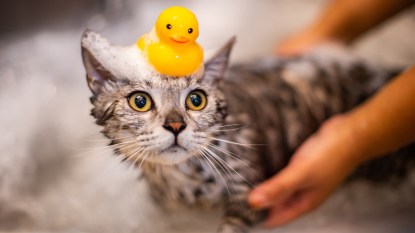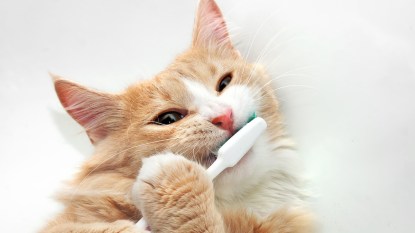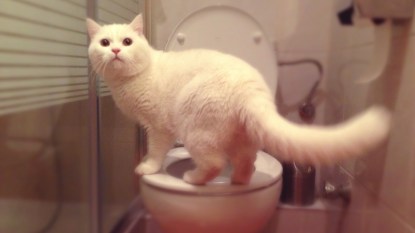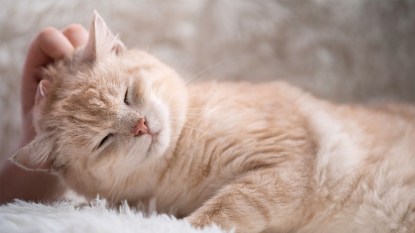Is Your Cat Sad? Here’s How to Tell
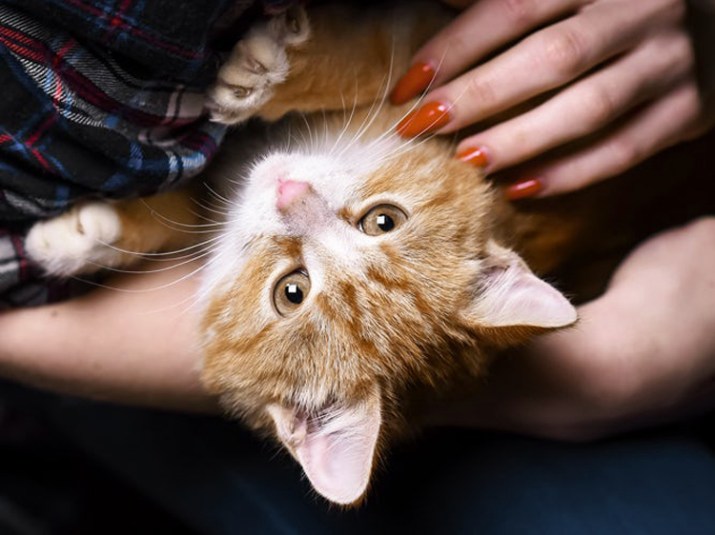
Do you have a sad cat on your hands? It can be tough to tell at first. Our feline friends are notoriously hard to read, especially when it comes to emotions. But experts think kitties can indeed experience deep sadness, and even depression in some cases. Here are some of the possible warning signs, so you can get your fur baby the treatment he or she needs as soon as possible.
According to Vet Street, experts often suspect a cat is suffering from depression based on nonspecific signs (aka general negative symptoms that can’t be assigned to a single cause) that last longer than a couple of weeks and cannot be explained by any other underlying medical issue. Veterinarian Wailani Sung, PhD, writes, “These nonspecific signs may include changes in their activity level, sleep-wake cycle, appetite, and interactions with their owners or housemates.” According to Dr. Sung, there’s usually a specific event that triggers intense sadness, like the loss of an owner or being put up for adoption. Sometimes it’s something as simple as moving with the same family to a new home.
Melancholy cats often display subtle signs that can go unnoticed if you’re not paying attention. According to Animal Authority, sad felines may keep their ears down and tail tucked to communicate their feelings. They may also sleep more than normal or do a shoddy job with grooming, so keep an eye out if your cat has an unusually unkempt coat. Changes in behavior are also worth looking into. Maybe your formerly social pet is now isolating himself or herself or perhaps your aloof cat has suddenly become clingy.
Obviously, it’s impossible to directly ask cats whether they’re feeling blue, so vets need to rely on the verbal and non-verbal communication that cats share with you, the fur mama. According to Catster, you’ll definitely want to report to your vet if your cat is not eating or overeating, under-grooming, hiding, or displaying unusual aggression, or excessive vocalization. In some cases, inappropriate litter box behavior might even be a sign of a cat being down in the dumps. Whatever the changes may be: Don’t just assume your cat’s personality has changed for no reason and ignore it.
“Depressed cats, especially cats who are grieving, will need extra compassion and care from their humans,” said cat consultant Ingrid King to Catster. “Spending extra time with the cat, providing new toys or beds, interactive playtime, and special treats can all help.”
If you suspect your cat might be very sad or depressed, make an appointment with your vet ASAP so they can rule out any other illnesses. And if it turns out your cat is suffering after all, the vet can give you personalized recommendations, such as medication or other treatment, that suit your pet’s needs.
More From Woman’s World
How to Make Your Cat’s Trip to the Vet Less Stressful
Why Do Cats Lay On Top Of You? It’s Actually a Huge Compliment
A Cat’s ‘Elevator Butt’ Is a Real Thing — And It’s the Highest Compliment Your Pet Can Give You





